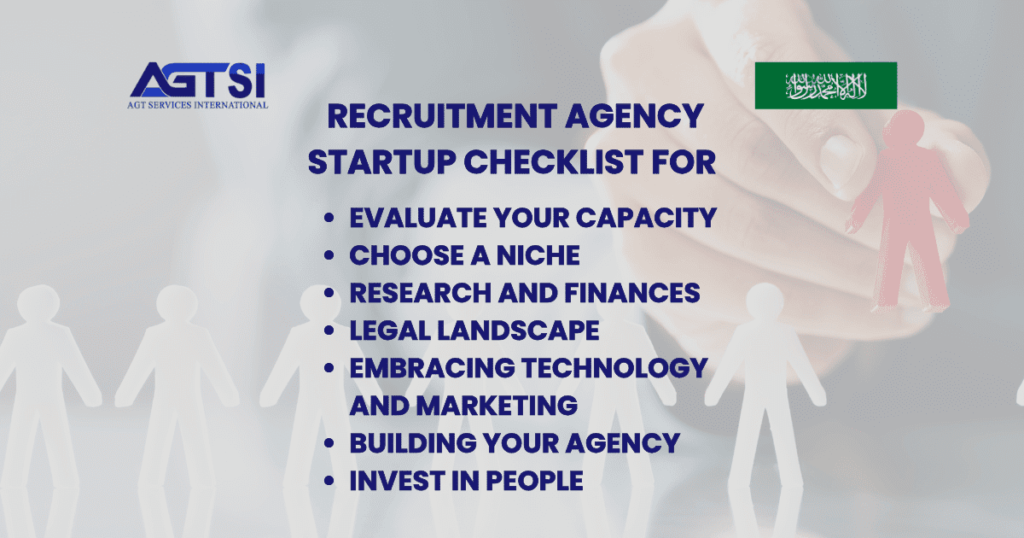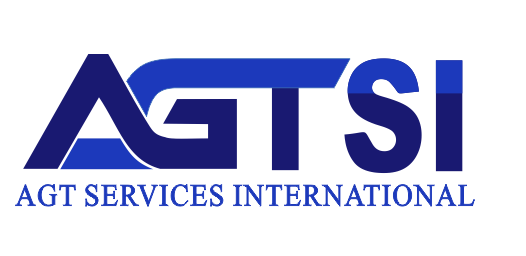Introduction
In today’s busy global economy, the need for skilled professionals has never been greater. As businesses aim for growth and wealth, the search for the perfect talent becomes important. This is where the value of recruitment agencies glows through. If you’re considering the exciting journey into entrepreneurship, particularly in the domain of launching your very own recruitment agency, you’re heading in the right direction.
In this guide, we’ll guide you through the important steps to start up a recruitment agency in 2024, offering valuable insights collected from industry best practices and drawing inspiration from the successful journey of our CEO, Yasir Arafat, the visionary leader behind AGT Manpower Recruitment Agency, this article outlines the wealth of experience and expertise that has led to the creation of a successful recruitment agency.
How to Start a Recruitment Agency?
Starting a recruitment agency involves strategic steps for success. Estimate your capacity, skills, and network. Choose a niche, register the business, and ensure legal compliance. Research the market, competitors, and finances for a solid business plan. Invest in technology, establish an online presence, and develop a strong marketing strategy. Build a strong professional network and set up your agency with a physical or virtual office. Determine realistic service charges, considering industry standards. Continuous improvement and staying informed about industry trends are necessary for sustained success. Follow these steps for a successful recruitment business.

Step 1: Estimate Your Capacity
Tackling the journey of starting a staffing agency is an exciting experience, but before you dive in, it’s important to assess your capacity. This self-evaluation is a key step that can shape the trajectory of your recruitment business. Let’s delve into the key aspects you should consider. Assess your expertise, education, skills, connections, and background previous to taking any action. Choose whether you possess the qualities necessary for a staffing agency startup.
A: Self-Reflection:
Begin by reflecting on your own skills, background, and expertise. Identify your strengths, weaknesses, and areas of expertise. Consider how your unique qualities can contribute to the success of a recruitment agency.
B: Industry Knowledge:
Estimate understanding of the recruitment and staffing industry. Familiarize yourself with the current trends, challenges, and opportunities. This knowledge will be essential in making informed decisions as you guide through the establishment and operation of your agency.
C: Network Assessment:
Assess the strength of your professional network. A strong network can be a valuable asset in recruiting and connecting with clients. Consider your connections in various industries and how they can be leveraged to source top talent and attract potential clients.
D: Educational Background:
Review your educational background and qualifications. Determine if you have any relevant certifications or if additional training is needed. This is particularly important if your background is not directly related to human resources or staffing.
E: Resource Availability:
Assess the resources at your disposal, including financial resources, office space, and technology. Starting a recruitment agency requires an initial investment, and understanding your financial capacity is important. Ensure you have the resources to sustain the business during its early stages.
F: Experience and Expertise:
Consider your professional experience, especially if it includes recruitment or human resources roles. Assess how your past experiences have equipped you with the necessary skills to understand the dynamics of talent acquisition, client management, and the overall recruitment process.
G: Mentorship and Guidance:
Identify if you have access to mentors or advisors who can provide guidance in the staffing industry. Mentorship can be invaluable, offering insights and lessons from those who have successfully guided similar experiences.
H: Personal Commitment:
Evaluate your dedication to the experience. Starting and running a recruitment agency requires dedication, time, and effort. Assess if you are prepared for the challenges and responsibilities that come with entrepreneurship.
Step 2: Choose a Niche
Choosing a niche is a necessary part in the success of your staffing agency. It’s not just about finding a direction; it’s about filing in on a specific market or industry where your agency can succeed. The concept of upright recruitment, as observed in the IT staffing industry, is about specializing in a broader market.
Taking this a step further is niche recruiting, where agencies limit their focus even more. For example, some agencies only target roles like ‘Executive Directors for Nonprofit Companies.’ These agencies, dedicated to serving a specific market, showcase expertise and in-depth knowledge. They operate within their niche, leveraging a strong network and industry-specific know-how.
In the staffing landscape, going deep into a chosen niche, like Aquaculture Talent focusing on seafood-related jobs or Niche Recruitment specializing in digital, creative, marketing, head office, management, and HR roles, brings benefits like credibility, name honor, and momentum. Keep in mind that fees for niche agencies often involve a percentage of each placed candidate’s yearly package.
Step 3: Research Competitor in Your Niche
Conducting thorough research is necessary for the success of your recruitment agency. Knowing the industry, understanding your competitors, and evaluating the labor market are essential components.
A: Research as Much as You Can
Delve into complete research covering competitors, market needs, labor market trends, and economic conditions. Your findings will set the direction for your agency and help you make informed decisions.
Step 4: Study the Finances
Undertaking the journey of starting a recruitment agency demands a total understanding of your financial landscape. Assessing your finances is a key step, ensuring that your agency not only kicks off successfully but also succeeds in the competitive industry. Let’s explore the essential aspects of studying your finances to establish the way for a strong and sustainable recruitment experience.
A: Analyzing Financial Viability:
Before dipping into the complex details, take a micro view of your financial viability. Understand the resources at your disposal and determine if they align with the demands of running an efficient HR-related business. Consider factors such as office equipment, digital tools, staffing costs, and insurance.
B: Creating a Detailed Financial Plan:
Crafting a detailed financial plan is akin to charting a roadmap for your agency’s success. Calculate establishment and operational costs meticulously. From hiring staff to investing in essential software, every expense should be accounted for. This financial sheet becomes your guiding document, helping you avoid unexpected setbacks mid-way through your entrepreneurial journey.
C: Assessing Available Capital:
Gauge the funds available for your recruitment startup. Knowing the extent of your financial resources is crucial. Explore whether you can secure credit loans or seek assistance from state programs. If considering third-party involvement like investors or lenders, precisely determine the required amount. Creating a budget spreadsheet and seeking financial advice ensure that you cover all essential aspects.
D: Exploring Partnerships and Backing:
Consider partnerships or seeking financial backing, but do so carefully. Collaboration can improve efficiency, especially in the early stages. However, calculate the long-term implications, ensuring you can comfortably manage any loans. While having support is beneficial, it’s essential to avoid extreme debts and financial commitments that could risk your agency’s stability before it even takes off.
E: Strategic Financial Decision-Making:
Guiding the financial landscape requires strategic decision-making. Focus on avoiding unnecessary debts and commitments to third parties, safeguarding the goodness of your recruitment agency. Look for partnerships that work well with your agency’s long-term goals, helping to create a more productive and efficient team.
Step 5: Research Laws and Regulations
A: Navigating the Legal Landscape:
In the recruitment industry, not being aware of laws and regulations can be risky. Just like you carefully study market trends and financial aspects, it’s important to understand the legal framework. Forgetting to do so may lead to legal breaches or management that could have severe consequences.
B: Building a Knowledgeable Team:
To ensure complete legal compliance, consider building a team of professionals, including lawyers and legal advisors. Their expertise is valuable in analyzing and implementing the latest policies and rules controlling the industry. While having legal experts on board is important, as the founder, it’s equally essential to hire in ongoing research actively.
C: Continuous Learning:
Legalities grow, and staying up-to-date on the latest changes is a responsibility that rests on your shoulders. Save time by continuously learning about relevant laws and regulations. This bold approach not only protects your agency from potential legal traps but also shows a commitment to honest and lawful practices.
D: Focus on GDPR Compliance:
Data protection is a foundation of legal considerations for recruitment agencies. Strict observation of General Data Protection Regulation (GDPR) regulations is non-negotiable. Educate yourself about the details of GDPR and ensure that your agency’s practices comply with the specified data protection requirements.
E: Utilize Legal Software Solutions:
In the digital age, leveraging technology is not limited to recruitment processes; it extends to legal compliance as well. Consider investing in state-of-the-art software solutions designed to track and manage policy changes and legal requirements. Such tools can serve as aggressive protection, providing real-time updates and mitigating the risk of non-compliance.
Step 6: Business Registration:
Ensure legal compliance and establish a solid foundation for your consultancy by registering your business. This involves submitting essential documents such as passport-sized photos, PAN cards, identity and address proofs, Aadhar cards, and proof of business office address.
Step 7: Global Tax Registration and Compliance:
Proper tax registration and compliance are important to running your global recruitment business smoothly. Below are the key references for guiding the tax terrain in different countries:
A: VAT/GST Registration:
- Understand the Value Added Tax (VAT) or Goods and Services Tax (GST) regulations in each country of operation.
- Register for VAT/GST where required, considering the thresholds and rules specific to each jurisdiction.
B: Business Registration:
- Comply with the business registration requirements of each country.
- Submit necessary documents such as proof of identity, business structure, and address details.
C: Local Licenses and Permits:
- Identify and obtain any local licenses or permits necessary for your recruitment business to operate legally.
- This may include industry-specific licenses or general business permits.
D: Social Security and Provident Fund:
- Explore the social security and provident fund obligations applicable in each country.
- Register and contribute to social security schemes as required by local employment laws.
E: Intellectual Property Protection:
- Safeguard your brand by understanding and complying with intellectual property laws.
- Register trademarks internationally to protect your business identity and brand assets.
F: International Recruitment Compliance:
- If engaging in international recruitment, research and adhere to specific regulations.
- Explore any licensing requirements for recruiting agents or agencies dealing with foreign applicants.
It’s important to work closely with legal and financial experts who specialize in international business regulations. Customize your approach based on the unique tax and licensing requirements of each country where your recruitment business operates. This aggressive strategy will ensure smooth operations, legal compliance, and a solid foundation for global success.
Step 8: Embracing Technology, Marketing, and a Strong Website Presence
In the quickly changing recruitment landscape, staying ahead requires a smart mix of adopting technology and effective marketing. As technology continues to shape the recruitment landscape, investing in the right tools becomes important. At the same time, actually marketing your agency boosts your visibility and reach in the competitive market.
An essential aspect of this digital transformation is the establishment of a rich website. Your agency’s online presence serves as its face in the digital domain. In addition, your website should focus on being user-friendly, secure, and providing valuable information. Consider it not only as an online office but also as a secure space where candidates and clients trust you with their information. Obtaining an SSL certificate is a fundamental step in assuring users that their data is well-protected, contributing to the overall credibility and success of your recruitment agency.
Step 9: Technological Investments for Tomorrow
As per a Career Builder survey, 67% of hiring managers highlight the importance of technology in staffing companies. Establishing a recruitment agency in 2024 and the future requires significant investments in technology. Begin with software customized for your niche, like an advanced applicant tracking system. This investment simplifies candidate searches and positions your agency at the forefront of efficiency.”
Step 10: Unleashing the Power of Marketing
A strategic marketing plan is the heartbeat of any successful recruitment agency. Research indicates that a well-executed marketing strategy can elevate revenue by 38.4%. Your agency is the product, and its success hinges on effective advertising. Give a large budget to multi-platform marketing efforts. In a digital age, visibility solves credibility. People engage with what they know, making powerful marketing an essential element of your agency’s journey.
Step 11: Strategic Marketing Plans
Before your agency takes its first steps, lay the groundwork with a detailed marketing plan. Having an online presence that matches your agency’s values is important. Craft a logo and marketing material that reflects your agency’s style and values. Set up a website, use social media, create engaging content, and improve with SEO and AdWords. The visual and content elements should smoothly match your agency’s unique selling points.
Step 12: Building a Diverse and Inclusive Brand
Consider variety, equity, and inclusion when shaping agency policies. Your website becomes a platform to showcase your commitment to these values. Use career pages to highlight your employer branding, developing a company culture that resounds with potential candidates. Pay particular attention to detail, as visitors form opinions about your website in a fraction of a second. By following these steps, you’ll attract quality candidates and promote a digital presence that stands out.
Step 13: Building Your Agency and Connecting with Recruiters
Now that you have a solid foundation, building your recruitment agency requires a strategic process. Use the Internet, invest in technology, and actively connect with experienced recruiters to establish a strong and effective operation.
Building connections with experienced recruiters is valuable at this stage. Their wisdom in the challenges of recruitment can be game-changing. Moreover, such connections may open doors to potential clients they’ve once collaborated with. As you expand, consider the possibility of hiring experienced recruiters to improve your team. The collaboration between your skills and their expertise can extremely improve your hiring processes, making your agency more appealing to clients and promoting business growth.
Step 14: Set Up Your Recruitment Agency
In the current landscape, the Internet plays a key role in the recruitment process, with over 90% of job seekers applying online. Whether it’s a physical office or a virtual portal, showing a strong online presence is essential. Invest in web-based software, hire a capable team, and create connections with both clients and candidates. Learning from your competitor, focus on creating terms and conditions in contracts that prevent potential conflicts and ensure a smooth business operation.
Step 15: Determine Your Service Charges and Terms
After thorough financial planning, set real service charges, typically ranging from 20%-30% of a new hire’s first-year salary. Following the example of your competitor, emphasize the importance of establishing clear terms and conditions in contracts. This not only protects your agency but also sets expectations for both candidates and clients, stopping potential issues down the line.
Step 16: Invest in People
Taking a cue from another competitor, investing in your team is important. Beyond connecting with experienced recruiters, continuously invest in their development and knowledge. Recognize each recruiter’s strengths and help them succeed. Whether they’re experienced professionals or recruits, creating a positive and growth-oriented environment will strengthen your recruitment system. Consider sharing tips on recruiting recruiters to attract and retain talent effectively.
How to Start a Recruitment Firm? Recruitment Agency Startup Checklist for 2024
1. Evaluate Your Capacity
- Reflect on your skills, background, and expertise.
- Evaluate industry knowledge and stay updated on trends.
- Assess the strength of your professional network.
2. Choose a Niche
- Identify a specific market or industry for your agency.
- Consider vertical or niche recruitment for specialization.
- Recognize the benefits of credibility and name recognition.
3. Research and Finances
- Conduct comprehensive research on competitors and market needs.
- Analyze your financial viability and create a detailed financial plan.
- Explore funding options, including personal savings and loans.

4. Legal Landscape
- Understand laws and regulations related to the recruitment industry.
- Build a knowledgeable legal team or seek professional advice.
- Stay updated on legal changes, with a focus on GDPR compliance.
5. Embracing Technology and Marketing
- Establish a robust website with user-friendly and secure features.
- Invest in cloud-based recruitment software for streamlined operations.
- Develop a strategic marketing plan for online visibility.
6. Building Your Agency
- Connect with experienced recruiters for insights and potential clients.
- Set up your recruitment agency with a strong online presence.
- Determine service charges and terms, emphasizing clarity.
7. Invest in People
- Continuously invest in the development of your team.
- Recognize and leverage each recruiter’s strengths.
- Foster a positive and growth-oriented work environment.
Final Thoughts: Start up Recruitment Agency
Launching the journey to start a recruitment agency is a respectable decision in a world where talent is highly desired. By following these ten essential steps and incorporating insights from industry competitors, you can set the stage for a successful recruitment agency in 2024. Remember, continuous improvement, positive user experiences, and providing helpful content are the pillars of sustainable growth in the ever-evolving world of recruitment.
By adopting a complete approach and staying up-to-date with industry trends, you’ll not only establish a recruitment agency but also contribute to helping talent shortages and reducing unemployment – a win-win for both your business and the broader community.
How to Set Up a Recruitment Agency?
Begin by evaluating your skills, industry knowledge, and professional network.
Choose a niche to specialize in and proceed with business registration.
Conduct thorough market research, formulate a business plan, and ensure legal compliance.
Invest in technology, establish an online presence, and develop a marketing strategy.
Set up a physical or virtual office and determine realistic service charges and contract terms.
How Much Do Legal Recruiters Make Per Placement?
Earnings for legal recruiters vary but often include a percentage of the candidate’s annual salary.
On average, legal recruiters can earn commissions ranging from 15% to 30% of the candidate’s salary.
Successful placements and experience in the legal recruiting field contribute to higher earning potential.
How to Set Up a Recruitment Company?
Evaluate your skills, industry knowledge, and professional network.
Choose a niche and proceed with business registration, adhering to legal requirements.
Register with relevant authorities, such as GST, MSME, and obtain necessary licenses.
Invest in technology, establish an online presence, and develop a robust marketing strategy.
Set up a physical or virtual office, hire skilled staff, and determine realistic service charges.



















